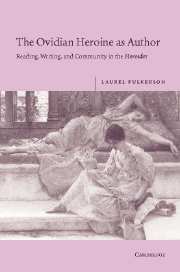Book contents
- Frontmatter
- Contents
- Acknowledgments
- List of abbreviations
- Introduction
- 1 Reading dangerously: Phyllis, Dido, Ariadne, and Medea
- 2 Reading the future?: Hypsipyle, Medea, and Oenone
- 3 Benefits of communal writing: Canace and Hypermestra
- 4 A feminine reading of epic: Briseis and Hermione
- 5 Reading magically: Deianira and Laodamia
- 6 Reading like a virgin: Phaedra and Ariadne
- 7 Caveat lector: thoughts on gender and power
- Appendix: The authenticity (and “authenticity”) of Heroides 15
- Bibliography
- Index
- Index Locorum
3 - Benefits of communal writing: Canace and Hypermestra
Published online by Cambridge University Press: 22 September 2009
- Frontmatter
- Contents
- Acknowledgments
- List of abbreviations
- Introduction
- 1 Reading dangerously: Phyllis, Dido, Ariadne, and Medea
- 2 Reading the future?: Hypsipyle, Medea, and Oenone
- 3 Benefits of communal writing: Canace and Hypermestra
- 4 A feminine reading of epic: Briseis and Hermione
- 5 Reading magically: Deianira and Laodamia
- 6 Reading like a virgin: Phaedra and Ariadne
- 7 Caveat lector: thoughts on gender and power
- Appendix: The authenticity (and “authenticity”) of Heroides 15
- Bibliography
- Index
- Index Locorum
Summary
The previous two chapters have attempted to reframe the charges of reiteration and ineffectiveness of traditional Heroides scholarship by suggesting that the first is part of what makes the Heroides such a compelling text and that the second is true only in terms of larger public discourse (and not always there); the effect of women's writing on other women, and sometimes on their own stories, by contrast, has been underappreciated. This chapter continues the study by discussing significant but unnoticed similarities between Heroides 11 and 14: each of their heroines writes her letter believing that her father wants her dead, in each case because she has undertaken an illicit or unsanctioned relationship with a family member. I argue that Hypermestra, the author of Heroides 14, may have read Canace's letter and used it to her advantage. Indeed, her letter is one of the few in which my model of community brings material benefit to the heroines, and in fact, my portrait of a Hypermestra with the power to positively affect her own story is unparalleled in the Heroides. Canace's letter, similarly, persuades one of her readers to do her bidding, and simultaneously offers a compelling image of Canace as of tremendous intratextual influence.
I first explore the contexts of each woman's story, which play a vital role in understanding them, and then outline the duplicity inherent in both letters.
- Type
- Chapter
- Information
- The Ovidian Heroine as AuthorReading, Writing, and Community in the Heroides, pp. 67 - 86Publisher: Cambridge University PressPrint publication year: 2005



